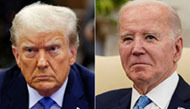HONG KONG - China has bought more than $1 trillion of American debt, but as the global downturn has intensified, Beijing is starting to keep more of its money at home, a move that could have painful effects for American borrowers.
The declining Chinese appetite for United States debt comes at an inconvenient time.
President Barack Obama has predicted the possibility of trillion-dollar deficits“for years to come,”even after an $800 billion stimulus package. Normally, China would be the most avid taker of the debt required to pay for those deficits, mainly short-term Treasuries.
In the last five years, China has spent as much as one-seventh of its entire economic output buying foreign debt, mostly American. In September, it surpassed Japan as the largest overseas holder of Treasuries.
But now Beijing is seeking to pay for its own $600 billion stimulus -just as tax revenue is falling sharply as the Chinese economy slows. Regulators have ordered banks to lend more money to small and medium-size enterprises, many of which are struggling with lower exports, and to local governments to build new roads and other projects.
“All the key drivers of China’s Treasury purchases are disappearing - there’s a waning appetite for dollars and a waning appetite for Treasuries, and that complicates the outlook for interest rates,”said Ben Simpfendorfer, an economist in the Hong Kong office of the Royal Bank of Scotland.
Fitch Ratings, the credit rating agency, forecasts that China’s foreign reserves will increase by $177 billion this year - a large number, but down sharply from an estimated $415 billion last year.
China’s voracious demand for American bonds has helped keep interest rates low for borrowers ranging from the federal government to home buyers. Reduced Chinese enthusiasm for buying American bonds could push those rates back up.
For now, of course, there seems to be no shortage of buyers for Treasury bonds and other debt instruments as investors flee global economic uncertainty for the stability of United States government debt. The long-term effects of China’s using its money to increase its people’s standard of living, and the United States’becoming less dependent on one lender, could even be positive. But that rebalancing must happen gradually to not hurt the value of American bonds or of China’s huge holdings.
Another danger is that investors will demand higher returns for holding Treasury securities, which will put pressure on the United States government to increase the interest rates those securities pay. As those interest rates increase, they will put pressure on the interest rates that other borrowers pay.
When and how all that will happen is unknowable. What is clear now is that the impact of the global downturn on China’s finances has been striking, and it is having an effect on what the Chinese government does with its money.
The central government’s tax revenue soared 32 percent in 2007, as factories across China ran at full speed. But by November,government revenue had dropped 3 percent from a year earlier. That prompted Finance Minister Xie Xuren to warn this month that 2009 would be“a difficult fiscal year.”
A senior central bank official, Cai Qiusheng, mentioned just before Christmas that China’s $1.9 trillion foreign exchange reserves had actually begun to shrink. The reserves - mainly bonds issued by the Treasury, Fannie Mae and Freddie Mac - had for the most part been rising quickly ever since the Asian financial crisis in 1998.
China manages its reserves with considerable secrecy. But economists believe about 70 percent is denominated in dollars and most of the rest in euros.
Two officials of the People’s Bank of China, the nation’s central bank, said in separate interviews that the government still had enough money available to buy dollars to prevent China’s currency, the yuan, from rising. A stronger yuan would make Chinese exports less competitive.
China’s leadership is likely to avoid any complete halt to purchases of Treasuries for fear of appearing to be torpedoing American chances for an economic recovery at a vulnerable time, said Paul Tang, the chief economist at the Bank of East Asia here.
“This is a political decision,”he said.“This is not purely an investment decision.”
스마터리빙
more [ 건강]
[ 건강]이제 혈관 건강도 챙기자!
[현대해운]우리 눈에 보이지 않기 때문에 혈관 건강을 챙기는 것은 결코 쉽지 않은데요. 여러분은 혈관 건강을 유지하기 위해 어떤 노력을 하시나요?
 [ 건강]
[ 건강]내 몸이 건강해지는 과일궁합
 [ 라이프]
[ 라이프]벌레야 물럿거라! 천연 해충제 만들기
 [ 건강]
[ 건강]혈압 낮추는데 좋은 식품
[현대해운]혈관 건강은 주로 노화가 진행되면서 지켜야 할 문제라고 인식되어 왔습니다. 최근 생활 패턴과 식생활의 변화로 혈관의 노화 진행이 빨라지고
사람·사람들
more많이 본 기사
- 시리아 “미군 살해범, IS 연루 의혹에 해고 직전 범행”
- 젤렌스키 “나토 가입 대신 서방 집단방위 보장으로 타협”
- 시드니 해변 총격 사망자 16명으로 늘어…1명은 어린이
- 트럼프, 시리아內 미군공격에 연일 보복 거론… “큰 피해 있을것”
- 성탄절 초록잎 아래 5초간 1천435쌍 입맞춤…워싱턴 기네스기록
- ‘이럴수가’ 송성문 ‘120억 초대박 계약’ 무효 가능성 현실화, 美 현지 소식 나왔다 “MLB서 최소 5개 구단 관심”
- BTS 정국·에스파 윈터, 열애설에 침묵 후 근황..논란 언급 없이 팬들과 소통
- ‘53세’ 김민종 “2년 안에 결혼한다” 폭탄 발언..일·사랑 모두 잡을까
- “트럼프, 바이든 데자뷔인줄” 취임 1년새 고령 논란·지지율 뚝
- 윤영호, ‘플리바게닝’ 노렸나…자충수 된 ‘민주당 금품’ 진술
- “머스크처럼…” 미국인 대리모 통해 2세 퍼트리는 中재벌
- ‘연준의장 후보’ 해싯 “대통령 목소리는 의견일뿐…FOMC가 투표”
- 도쿄행 유나이티드 항공편, 엔진 고장에 워싱턴으로 회항
- 주말 濠·美서 총기사건…시드니 11명·브라운대 2명 사망
- 내년 중간선거 낙관못하는 트럼프… “경제성과 전달에 시간 걸려”
- 트럼프 특사·젤렌스키 ‘베를린 회동’…우크라 종전안 진전되나
- 주말 濠·美서 총기사건…시드니 11명·브라운대 2명 사망
- 경찰직무집행법 통과로 1차 필버 종료…연말 ‘필버 재격돌’ 전망
- “사초 쓰겠다”던 내란특검 ‘180일 대장정’ 마침표…24명 재판에
- 바비킴, 15년 만에 ‘기내 난동 논란’ 재언급.. “공격적 태도 사과하고파”
- [특파원시선] 외식비 줄이는 미국… ‘30% 요구’ 팁 공포도 한몫?
- 김지수, 꿀꿀했던 韓 떠났다.. “에펠탑 보니 메마른 낭만 살아나”
- ‘단 4개월 만에’ 손흥민 美 정복, MLS 공식 ‘올해의 영입 2위’... “리그 판도 뒤바꿔”
- ‘무려 키패스 3회+평점 8.2’ 이강인 특급 맹활약, 5호 공격P 작렬... ‘간신히’ PSG 선두 탈환
- 내년 중간선거 낙관못하는 트럼프… “경제성과 전달에 시간 걸려”
- 정용진 신세계그룹 회장, 밴스 부통령 성탄절 만찬 참석
- ‘손흥민 벽화 3일 만에 그린’ 예술가, SON과 감격 만남 후 “내 아들의 영웅이자 아시아 유산” 찬사
- 뉴욕 백화점서 아기 기저귀 갈던 엄마, 정신질환자에 흉기피습
- 변요한♥티파니, 약지에 ‘커플링·포르쉐’..열애 中 티냈다
- ‘김민재 점점 독일 국대에 밀린다’ 독일 현지, 타 향해 연일 찬사... “뮌헨 최고의 영입, 진정한 수비 리더”
- AI 시장 흔들렸다…챗GPT 독주 속 제미나이 급부상
- 인도 투어 나선 축구스타 메시…경기장 조기 퇴장에 팬들 난동
- 지선 손 맞잡을까…통일교 특검으로 거리 좁히는 국힘·개혁신당
- 조미김, 미국 수출관세 ‘면제’됐다…K-김 최대시장서 날개
- 트럼프 “태국·캄, 교전 중단 합의”… 1
- 트럼프 “인디애나 선거구 조정 반대한 공화의원들, 교체돼야”
- 국방부 “시리아서 공격받아 미군 2명 사망…공격범 사살”
- ‘인니 수마트라섬 대홍수’ 사망자 1천명 넘어…218명 실종
- 오세훈 “내집 마련 꿈, 10·15대책에 짓밟혀…규제 완화해야”
- 10석 안팎까지?…내년 한국 지방선거 때 ‘미니 총선급’ 재보선 가능성
- “다카이치 ‘대만발언’은 對中전략 부재 탓…정상 만나야 해결”
- 트럼프, 시리아서 IS 공격으로 美병사 사망하자 “강력 보복”
- 한소희, 韓 떠나기 전 의미심장 SN… 1
- 연말연시 과음 후 속쓰림…단순숙취? “급성염증 신호일수도”
- 아이비리그 브라운대서 총격…최소 2명 사망, 8명 중상
- 트럼프 “인디애나 선거구 조정 반대한 공화의원들, 교체돼야”
- 1124일만 선고.. ‘20억 횡령 인정’ 박수홍 친형 결론은?
- 이정후 태극마크 ‘청신호’ 떴다! 스타 출신 SF 사장 “야수보단 투수가 WBC 위험”→걸림돌 사라졌다
- 韓 탁구 최초 역사… 신유빈-임종훈, 세계랭킹 1위+파리올림픽 金 듀오 꺾고 WTT 파이널스 우승
- 김연아♥고우림, 사랑하니 닮아가네..예쁜 커플사진
1/5지식톡

-
 테슬라 자동차 시트커버 장착
0
테슬라 자동차 시트커버 장착
0테슬라 시트커버, 사놓고 아직 못 씌우셨죠?장착이 생각보다 쉽지 않습니다.20년 경력 전문가에게 맡기세요 — 깔끔하고 딱 맞게 장착해드립니다!장착비용:앞좌석: $40뒷좌석: $60앞·뒷좌석 …
-
 식당용 부탄가스
0
식당용 부탄가스
0식당용 부탄가스 홀세일 합니다 로스앤젤레스 다운타운 픽업 가능 안녕 하세요?강아지 & 고양이 모든 애완동물 / 반려동물 식품 & 모든 애완동물/반려동물 관련 제품들 전문적으로 홀세일/취급하는 회사 입니다 100% …
-
 ACSL 국제 컴퓨터 과학 대회, …
0
ACSL 국제 컴퓨터 과학 대회, …
0웹사이트 : www.eduspot.co.kr 카카오톡 상담하기 : https://pf.kakao.com/_BEQWxb블로그 : https://blog.naver.com/eduspotmain안녕하세요, 에듀스팟입니다…
-
 바디프렌드 안마의자 창고 리퍼브 세…
0
바디프렌드 안마의자 창고 리퍼브 세…
0거의 새제품급 리퍼브 안마의자 대방출 한다고 합니다!8월 23일(토)…24일(일) 단 이틀!특가 판매가Famille: $500 ~ $1,000Falcon: $1,500 ~ $2,500픽업 & 배송직접 픽업 가능LA…
-
 바디프렌드 안마의자 창고 리퍼브 세…
0
바디프렌드 안마의자 창고 리퍼브 세…
0거의 새제품급 리퍼브 안마의자 대방출 한다고 합니다!8월 23일(토)…24일(일) 단 이틀!특가 판매가Famille: $500 ~ $1,000Falcon: $1,500 ~ $2,500픽업 & 배송직접 픽업 가능LA…
케이타운 1번가
오늘의 1면
오피니언

22기 LA평통 출범에 거는 기대

연말 시즌 사기·범죄 경계해야
 메건 매카들 워싱턴포스트 칼럼니스트
메건 매카들 워싱턴포스트 칼럼니스트 [메건 매카들 칼럼] 장편영화의 마지막 챕터인가
 김미선 서북미문인협회 회장시인
김미선 서북미문인협회 회장시인 [한국춘추] 하늘을 계산한 사람들, 칠정산
 이희숙 시인·수필가
이희숙 시인·수필가 [금요단상] 그을린 자리에서 다시
 심상용 / 서울대 미술관장
심상용 / 서울대 미술관장 [미술 다시보기] 지옥에 대하여
 서정명 / 서울경제 기자
서정명 / 서울경제 기자[만화경] 주한미군과 ‘도련선 리스크’
 한 영 재미수필가협회 회장
한 영 재미수필가협회 회장 [한영의 독서칼럼] 불안한 사람들
 정영현 서울경제 테크성장부장
정영현 서울경제 테크성장부장 [여명] 콘크리트가 데이터가 됐을 뿐, 달라진 게 없다
1/3지사별 뉴스

“마약밀매·인신매매 등 국제범죄 척결” ‘국토안보 태스크포스’ 뉴욕지부 출범
연방 국토안보부가 10일 ‘국토안보 태스크포스’(HSTF) 뉴욕지부를 출범시켰다.HSTF는 마약 카르텔, 인신매매, 자금세탁, 갱단 등 국제범…
‘오바마케어 보조금’ 올해 말 종료 가능성 ↑ 커져

한국 교사 10명, 페어팩스 초등교 배치
‘글로벌 앰버서더 티처스 프로그램’(Global Ambassador Teachers Program)은 국제 교사 교환 프로그램 가운데 하나로 …
김찬수씨, 포토맥 포럼에 2천달러 기부

주말 濠·美서 총기사건…시드니 11명·브라운대 2명 사망
주말 미국과 호주에서 각각 10명 이상의 사상자가 나온 대형 총기 사건이 발생했다.14일(이하 현지시간) 호주의 유명 해변에서 약 1천명 참석…
내년 중간선거 낙관못하는 트럼프… “경제성과 전달에 시간 걸려”

오늘 하루 이 창 열지 않음 닫기 





















































.png)


댓글 안에 당신의 성숙함도 담아 주세요.
'오늘의 한마디'는 기사에 대하여 자신의 생각을 말하고 남의 생각을 들으며 서로 다양한 의견을 나누는 공간입니다. 그러나 간혹 불건전한 내용을 올리시는 분들이 계셔서 건전한 인터넷문화 정착을 위해 아래와 같은 운영원칙을 적용합니다.
자체 모니터링을 통해 아래에 해당하는 내용이 포함된 댓글이 발견되면 예고없이 삭제 조치를 하겠습니다.
불건전한 댓글을 올리거나, 이름에 비속어 및 상대방의 불쾌감을 주는 단어를 사용, 유명인 또는 특정 일반인을 사칭하는 경우 이용에 대한 차단 제재를 받을 수 있습니다. 차단될 경우, 일주일간 댓글을 달수 없게 됩니다.
명예훼손, 개인정보 유출, 욕설 등 법률에 위반되는 댓글은 관계 법령에 의거 민형사상 처벌을 받을 수 있으니 이용에 주의를 부탁드립니다.
Close
x